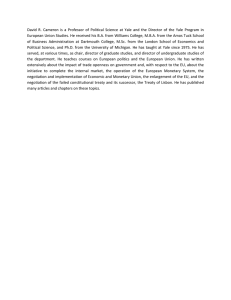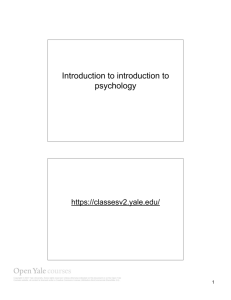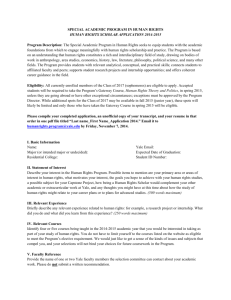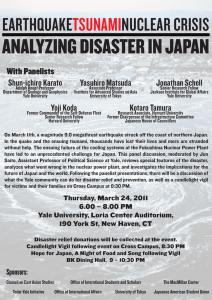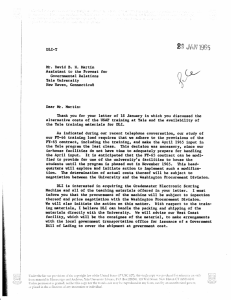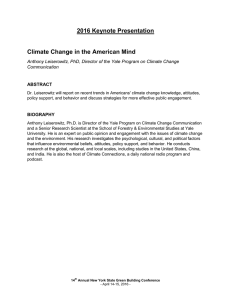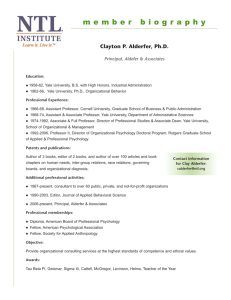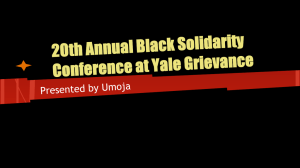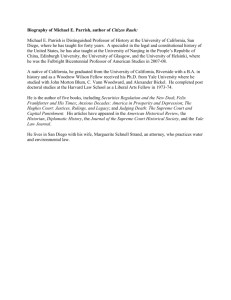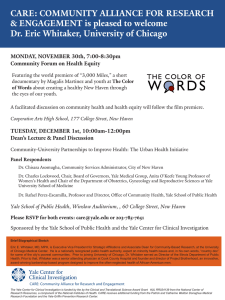Document 11380094
advertisement
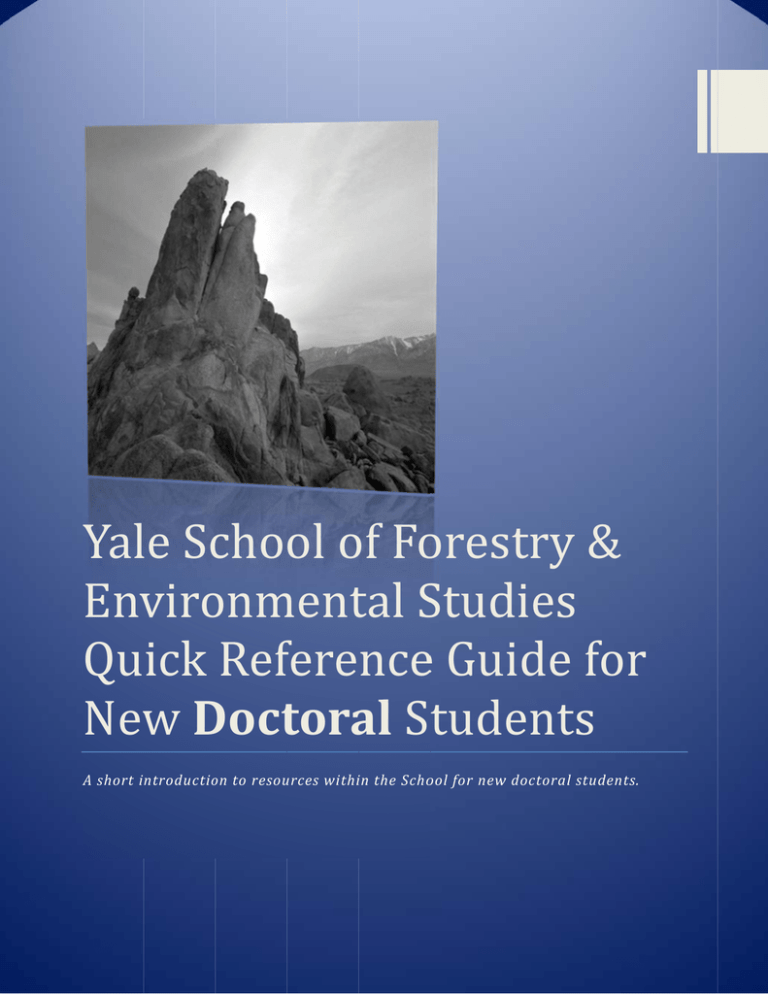
YalleScchoolo ofFo oresstry y& Env viro onm menttalSStud diess QuickRefferenceeGu uideforr New wD Docttora alStudentts Ashorti ntroductio ontoresou urceswithiintheSchooolfornew wdoctoral students. School of Forestry & Environmental Studies Reference Guide to F&ES for New Doctoral Students Contents F&ES Doctoral Program.................................................................................................................. 2 Academic Calendar-Abbreviated .................................................................................................... 3 Housing Information ........................................................................................................................ 4 Student Directory: Create your own profile ................................................................................... 6 Student Computer Resources and Services .................................................................................... 8 Library Information ....................................................................................................................... 10 Career Development Office ............................................................................................................ 11 Research Office ............................................................................................................................... 14 The Professional Skills Module Programs .................................................................................... 15 Useful Websites ............................................................................................................................... 17 Other Campus Contact Information ............................................................................................. 18 Diversity Initiatives ......................................................................................................................... 19 Student Organizations within F&ES ............................................................................................ 20 2015 Reference Guide for New Students 1 School of Forestry & Environmental Studies This guide is intended to introduce some of the resources available to Ph.D. students within the School. It is by no means exhaustive. F&ES Doctoral Program The Doctoral Program Office works with the Yale Graduate School of Arts and Sciences to administer the Ph.D. program within F&ES. Please feel free to contact us at any time with questions or concerns. Director of Doctoral Studies: Professor Karen Seto, 380 Edwards Street, room 102 Doctoral Program Coordinator: Elisabeth Barsa, Sage Hall, 205 Prospect St., room 7, 203-432-5146 Doctoral Student Mailboxes: Sage Hall, 205 Prospect St., room 8B F&ES Doctoral Program webpage: http://environment.yale.edu/doctoral F&ES Doctoral Student Listserv: fesdoctoral-list@panlists.yale.edu 2015 Reference Guide for New Students 2 School of Forestry & Environmental Studies Yale University School of Forestry & Environmental Studies (F&ES)*Abbreviated* 2015 - 2016 Academic Calendar-Abbreviated Fall Term 2015: ---Important Orientation Dates— August 24 Yale Graduate School Orientation Events Begin. For a complete schedule see http://gsas.yale.edu/orientation-new-students-august-24-sept1-2015 August 31 Dean’s Welcome & *F&ES DOCTORAL PROGRAM ORIENTATION DAY* September 1 F&ES Course Expo, 9:00 a.m. September 2 Fall Term Classes Begin, 8:30 a.m. September 7 Labor Day; Classes do not meet October 9 F&ES Doctoral Student Research Conference October 20 October Recess begins, 11:00 p.m. October 26 Classes resume, 8:30 a.m. November 20 November Recess Begins, 5:30 p.m. November 30 Classes Resume, 8:30 a.m. December 11 Classes End, Reading Period Begins, 5:30 p.m. December 12-22 Reading Period/Final Examinations December 22 Fall Semester Ends; Winter Recess Begins, 5:30 p.m. Spring Term 2016: January 19 Spring Term Classes Begin March 11 Spring Recess Begins, 5:30 p.m. March 28 Classes Resume, 8:30 a.m. April 29 Classes End, Reading Period Begins, 5:30 p.m. April 30 - May 11 Reading Period/Final Examinations May 11 . May 23 Spring Semester Ends, 5:30 p.m University Commencement 2015 Reference Guide for New Students 3 School of Forestry & Environmental Studies Housing Information F&ES offers a general overview on accommodations, options and questions you may have concerning housing. The F&ES Housing Google Sheet is for new students, as well as returning students, to communicate with each other to find a suitable or a compatible roommate/housemate on their own. The average rent may range anywhere from $600 to $1400; your portion will depend on how many people share an apartment. Yale’s Department of Graduate Housing maintains a computerized listing of off-campus rental apartments, houses, sublets, and roommate shares for the convenience of the Yale community (see page C-3). It is recommended students live in the area outlined on the map on the next page. On-campus, graduate dormitory and apartment information and applications can be found at the site below. However, on-campus housing is limited in supply and first year students are not guaranteed on-campus housing. Below are a few links that you may find helpful in your search: Available Housing Sites and Other Useful Links: 1. F&ES Housing Google Sheet ~ to access the Google document housing match-up project https://docs.google.com/spreadsheet/ccc?key=0AkVn34EDAjldGxjOXJxQlFEbm90WHFpNkNYNGZCaFE&usp=sharing&authkey=CLmeu2c#gid=9 There are tabs at the bottom of the spreadsheet for those offering housing and those looking for housing. When posting your information, include a brief bio and the most up-to-date contact information so that your future classmates can get in touch with you. 2. Craigs List ~ http://newhaven.craigslist.org/ 3. Hadley, Inc. ~ http://trumbullenterprises.com/ 4. Vacancy Busters ~ http://www.vacancybusters.com/ 5. Susan Frew – Frew & Frew LLC ~ http://www.susanfrew.com/ 6. University Properties ~ http://onhsa.yale.edu/up/home 7. Elm Campus Partners ~ http://www.elmcampus.com/ 8. Campus Map – Click on Science Hill ~ http://map.yale.edu/map/ 9. Yale Shuttle Schedule and Map ~ http://to.yale.edu/ 10. Pad Mapper ~ http://www.padmapper.com/ Renting Tips: 1. You may want to select your housing to be in the area blocked off on the map on the next page to be within walking distance of F&ES. 2. Be sure to read all lease information carefully before signing. 3. Take pictures of EVERYTHING before moving in - to document condition. 4. Make sure original walk through thoroughly documents condition of all parts of the apartment. 5. Make sure you have and keep a copy of the walk-through documentation with your lease. If you have additional questions concerning housing, please contact Mariann Adams at mariann.adams@yale.edu. 2015 Reference Guide for New Students 4 Schoool of Foresttry & Enviroonmental Sttudies Most F& &ES students live in the area a outlined d below! de for New Students S 2015 Refference Guid 5 Schoool of Foresttry & Enviroonmental Sttudies Studentt Directory y: Create your own profile As an F&ES student, you y have the opportunity o to o create your oown online prrofile within tthe school’s websites. There are two o componentss to this: A public profille, which listss you on the public p websitee. A myFES profi file, which is used u internally y at the schoool, so that the faculty and sstaff can put a face with w your nam me. You havee control over your own pro ofile, and can update it wheenever you likke, using the instructions below starrting in July 2015 2 MANAG GING YOUR PROFILES Step 1: http://environ h nment.yale.edu/myfes/ Step 2: Login, L using your Yale NetID N and password. Step 3: Make M Changees to Your Web W Profile There aree several diffferent section ns of inform mation; Privaccy / Generall, Student Exxtras (work ex xperience, traavel, languag ges, etc.), Po ortraits, Abouut / Bio, etc. Please add as much informatiion as you caan. de for New Students S 2015 Refference Guid 6 School of Forestry & Environmental Studies Step 4: Don’t forget to save Changes on each page/section as you go. 2015 Reference Guide for New Students 7 School of Forestry & Environmental Studies Student Computer Resources and Services Some common questions that are brought to the F&ES IT Department: 1) Will I need a computer? Yes, it is our expectation that you will arrive on campus with a laptop computer capable of running Windows 7 SP1, or Mac OS X 10.8 (Mountain Lion) or higher. We do not support the Linux platform. Our recommended student computer specs are: i5 Processor or better 256GB hard drive or better 8GB of RAM or better We highly recommend Apple MacBook series or Lenovo ThinkPad T or ThinkPad X series machines. You will need your computer for the IT orientation program (scheduled in August; details TBA), so please bring it with you when you come to campus. 2) I don't have a Notebook computer. What kind should I buy? The majority of student laptops at F&ES are using Apple MacBook Airs or MacBook Pros. We also support Bootcamp or VirtualBox installations of Windows on Macs so you don't have to leave the world of Windows behind. Yale has negotiated a very favorable discount program for student computer purchases on Lenovo computers through GovConnection; see the Yale ePortal site (be sure to use your Yale email address when setting up your account). For security we recommend that you purchase the following items with your laptop, in addition to personal property insurance (note that bundles may include some of these items): On-site warranty support CompuTrace LoJack (Anti-theft software) Find My Mac (Mac Only) Laptop lock When comparing notebook computers, ask about the turn-around time for warranty repairs. Many students find it very difficult to be without a computer for a week or more while waiting for a repair to be completed (although the FES IT Department has some loaners). You may also wish to inquire about what the warranty covers. Most standard laptop warranties exclude the LCD display and a broken display can be quite costly to repair (up to $1,000). You may contact us at FESHelpDesk@yale.edu for assistance if you have questions. 3) I already have a laptop computer. Can I bring it? If you have an older laptop (pre-2011) we strongly urge you to purchase a new laptop. If you do not purchase one through our program, you should at least have the minimum configuration of Windows 7, a 2 GHz Core 2 Duo processor, and 4 GB of RAM. We recommend, however, a minimum of 8 GB of RAM, i5 processor, Windows 7 SP1 64-bit on all PCs. For MacBooks/MacBook Pros we recommend 8 GB of RAM and Mac OS X 10.8 (Lion) or higher and at least 256gb of hard drive space. Your computer should be equipped with a wireless network adapter for accessing the Yale network while on campus. 2015 Reference Guide for New Students 8 School of Forestry & Environmental Studies 4) What software will I need? Yale maintains a Software Library that offers a variety of software either free or at a very low cost to students. You won’t need to install anything before arriving on campus. The Yale ePortal site provides links for buying other software that’s not available in the Yale Software Library, at discounted prices. F&ES also offers Microsoft OS and other Microsoft developer software to F&ES students at no charge through the DreamSpark Premium Program. 5) Will I need a printer? Yes, you should have an ink jet printer or personal laser printer suitable for printing letters and short papers where you live. There are also printers in the student computer cluster in Sage Hall and in the Ordway Learning Center in Kroon Hall as well in every F&ES building available for student use. Black & white printing currently costs 10 cents per page with the duplex side charged at 2 cents. Full color printing is charged at 25 cents per page. Students are responsible for all printing charges and this is managed via Yale’s BluePrint (PaperCut) program. Charges can be paid for by check, credit card, or student account charge. All student printers are capable of double-sided printing to conserve paper. 6) Will I need an external hard drive for data storage and backup? No but you may find it helpful; students may store, collaborate, and back up their data using Box.com. Each student receives 50 gigabytes of free disk space for storage and collaboration on Box.com. F&ES IT also provides a cloud-based backup system for students, CrashPlan ProE, for all students. This will be installed once you arrive on campus, during orientation and allows the backup of up to four devices. Student Computing Facilities and Support at F&ES With the help of our student computer assistants, we maintain a student computer cluster in Sage Hall, Room 39. The computer cluster is available on a 24-hour, seven days-a-week basis, and is equipped with 12 PC computers and 12 iMac computers, along with 3 27” iMac machines for video editing and 3 27” displays for plugging in of student laptops. All computers feature Adobe Creative Cloud Software. All Mac computers operate in both Mac OS and Windows platforms, and feature Microsoft Office, ESRI ArcGIS software, several statistical software packages, as well as software related directly to the F&ES curriculum. Several computers in Sage 39 have scanning hardware, and FinalCut Pro software installed. In addition to the F&ES IT staff, student techs also assist students with their IT needs. The student techs are generally available 7 days a week during the academic year with varying hours throughout the week. Loan Program F&ES currently has twenty laptops available to students for loan for a period of up to one week, renewable once for an additional week. These loaners are useful if your laptop is temporarily out of commission. iPads, GPS units, digital cameras, USB headsets, LCD projectors and various other items are also available to students for class- and research-related projects. All items for checkout can be viewed and reserved at the F&ES IT Loan Program catalog. The terms of service of the loan program can be viewed here. 2015 Reference Guide for New Students 9 School of Forestry & Environmental Studies Library Information The core Henry S. Graves Memorial Library Collection is housed in the Center for Science and Social Science Information (Kline Biology Tower, Concourse Level) and is a part of the Yale University Library System. The Graves Collection is one of the oldest and largest collections of forestry, natural resource, and related publications in the world. Current holdings in the Graves Collection consist of more than 130,000 books, documents, technical reports, and serial publications dealing with forestry, forest science, natural resource management, and environmental sciences and management. The entire collection, comprised of material dating from the eighteenth century to the present, is housed in a number of locations: the Center for Science and Social Science Information, Beinecke Rare Book Library, and the Library Shelving Facility. F&ES students have access to the enormous holdings of the Yale University Library which is comprised of over 15 million volumes, print and electronic. The library is committed to acquiring whatever books and journals are needed to support Yale’s teaching and research activities. The F&ES Librarian has an office in the Center for Science and Social Science Information (CSSSI and is available most weekday hours to provide assistance to students. Reference and information services are provided by experienced staff in the CSSSI. For electronic retrieval, the library has a network of databases accessible via its website, which cover general environmental topics, as well as the specific subject areas of forestry, soils, fish and wildlife, and water resources. Overall, Yale University Library subscribes to over 1,400 databases. Library resources outside of Yale are accessed through the BorrowDirect service as well as Interlibrary Loan. As a part of Yale University Library system, the F&ES Librarian participates in all library services offered to Yale patrons. The Yale University Library supports both EndNote and RefWorks bibliographic data management tools and the F&ES Librarian provides instruction in both. The F&ES Library Research homepage is located at http://guides.library.yale.edu/fes. Here are found links to Orbis, Yale’s main online catalog, as well as to help screens which assist in its use. Here also are links directly to several of the most frequently used bibliographic databases, such as BIOSIS, Web of Science, ProQuest Environmental Science Collection, Environment Complete, and CAB Abstracts. This webpage also provides a great deal of useful information, from instruction opportunities to online interlibrary loan forms and links to online full-text journals. In-house bibliographic instruction begins during MODs, and continues throughout the semester. Notification of tours and group instruction sessions will be posted via e-mail, or feel free to contact the librarian directly to set up an individual session. Librarian 203-432-5132 (CSSSI C40) All Yale University Libraries’ hours are posted at: http://web.library.yale.edu/buildings 2015 Reference Guide for New Students 10 School of Forestry & Environmental Studies Career Development Office The F&ES Career Development Office (CDO) orients students to a range of environmental career paths and provides the resources and career skills training needed to conduct effective job searches. Each year CDO facilitates opportunities to meet, interview and network with a broad group of employers and alumni. The office is open to F&ES masters and doctoral students and alumni. Students' spouses and significant others may seek assistance in local job searches. The mission of the Career Development Office is to educate, empower and support F&ES students as they actively seek internships and employment to advance their career visions, and to develop relationships with organizations to promote the hiring of our world’s future environmental leaders. Individual Counseling and Peer Review Our career counselors provide individual, confidential career guidance. The CDO is structured to provide career support for all types of career fields. The primary career sectors our students pursue fall into fifty categories (see The F&ES Fifty on page B-12). Appointments with professional staff are available daily and are conveniently scheduled online. Peer reviewers offer weekly drop-in hours. We offer: General Career Advising (strategy, focus, vision) Resume Reviews Cover Letter Reviews Personal Statement Reviews Networking Advice Online Tools Orientation (FESNext, LinkedIn, Yale Career Network) Interview Skills Review Internship Planning Guidance Internship Funding Advice Salary Negotiations Strategies Mock Interviews Workshops CDO offers annual, optional workshops on job search skills development and major career questions. Programs include: resume writing, networking and LinkedIn, writing the personal statement, cover letter writing, job and internship search strategy, applying for the PhD, interviewing, telling your story at the interview, locating grants and fellowships, and salary negotiations. Career Panels and Information Sessions CDO organizes thematic career panels annually, often in coordination with student interest groups focusing on particular fields or topics. Recent panels include: Careers in Wildlife Conservation, Demystifying the Application Process: Big International Development and Conservation, BNGO INGO ENGO: Alumni in NGOs Career Panel, and Going Green in a Down Economy: The View from Corporate America. We also provide important information sessions on applying for fellowships, grants, and jobs, including the Fulbright, Presidential Management Fellowship, and job and internship applications through USAJOBS. 2015 Reference Guide for New Students 11 School of Forestry & Environmental Studies SIG Career Event Support CDO works in collaboration with and offers support to SIGs to bring employers, alumni and relevant professionals to F&ES for small group career conversations. We are interested in supporting student initiatives to develop professional relationships and to share important career and industry information with peers. FESNext Our online job database, FESNext, offers you a central resource for job and internship postings targeted to FES students and alumni. It features postings from F&ES registered employers and includes opportunities shared by faculty, alumni, and fellow students. FESNext grants you access to: Maintain an up-to-date profile to receive targeted email announcements Upload resumes, cover letters, writing samples, and other documents to send to employers View over 150 F&ES focused jobs and internships added each month Apply directly online for jobs/internships of interest Publish your resume to multiple resume books for review by alumni and employers Create and save quick searches for locating jobs/internships Schedule appointments with career advisors Resume Book CDO provides the opportunity for students to showcase their skills and experience by publishing and distributing an annual resume book. We provide students a downloadable official template and Resume Content, Style and Format Guidelines. The pdf version of the book is distributed to employers (including alumni/employers), faculty, and relevant staff. Resumes books are part of CDO’s online FESNext service. Resumes must be submitted by October 1 for inclusion. All-Ivy Environmental and Sustainable Development Career Fair Each year CDO offers you the opportunity to explore career options, apply for upcoming positions, and practice your interview and networking skills at the All-Ivy Environmental and Sustainable Development Career Fair at Columbia University. You will have access to approximately 90 employers in a range of employment sectors. Treks CDO provides logistical support to groups of F&ES students interested in visiting employers onsite. While treks are student initiated and organized, CDO helps identify employer contacts, and provides strategic guidance in planning and outreach. All treks are self-funded. Past trek destinations have included New York City, San Francisco and Washington, D.C. On-Campus Recruiting In addition to recruiting through our major career fairs, CDO offers students the opportunity to connect with employers during on-campus information sessions, informational interviews and selected interview opportunities. F&ES students are also eligible to attend selected employer information sessions offered through School of Management, Jackson Institute of Public Policy and undergraduate career service offices. Students seeking opportunities with management consulting firms are encouraged to attend the early fall programs scheduled with Yale’s Office of Career Strategy. 2015 Reference Guide for New Students 12 School of Forestry & Environmental Studies Throughout the academic year, CDO hosts employers available to interview students through on-campus interviewing. Announcements for opportunities will be made via email and resume submissions for interview consideration will occur using FESNext. Employment and Internship Profiles and Salary Data To help you research job and internship options, we provide employment information on recent alumni and summer interns/researchers on our website. These downloadable documents provide outcomes details on all alumni from 2007 onward. Alumni Connections CDO offers the opportunity to network through alumni career panels, employer information sessions, career conversations, and evening mixers. In addition, you have access to alumni visiting classes, guests of F&ES Centers & Programs, and through numerous other venues at F&ES and at Yale. The following resources provide you with access to and information about alumni from F&ES and Yale: F&ES LinkedIn Group: The Office of Development and Alumni Services and the CDO maintain the Yale School of Forestry & Environmental Studies LinkedIn group. F&ES Alumni Database: You can download from the CDO website the most current F&ES alumni information available through Yale’s Alumni Association. Yale Career Network (YCN): You have access to 13,000 alumni who are available to give tips and advice on their industry, employer or job. CDO Staff and Responsibilities Director, Ladd Flock – ladd.flock@yale.edu Employer development, career counseling, and faculty relations Associate Director, Kathy Douglas – kathy.douglas@yale.edu Career counseling, career programming, and office communications Assistant Director, Alyssa Student – alyssa.student@yale.edu Employer relations, F&ES 006 management, Mentoring program administration 2015 Reference Guide for New Students 13 School of Forestry & Environmental Studies Research Office The F&ES Research Office is responsible for supporting applications to government sponsored funding sources (e.g., NSF, EPA, USDA, Fulbright). Their office is located in Sage Hall, 205 Prospect Street, fourth floor room 42A. Associate Dean for Research Karen C. Seto, Professor of Geography and Urbanization Director of Doctoral Studies 380 Edwards Street, New Haven, CT Chief of Staff and Assistant Dean Bethany Zemba Tel: (203) 432-2616; Fax: (203) 436-3051 Physical Address: Kroon Hall, Room 234 Associate Director of Research Susan (Bolden) Rodrigues Tel: (203) 432-6523 Sponsored Projects Coordinator Amelia Casey Tel: (203) 432-8638; Fax: (203) 436-4371 Pre/Post Award Grant Support Diana Morgan Tel: (203) 436-9083; Fax: (203) 436-4371 2015 Reference Guide for New Students 14 School of Forestry & Environmental Studies The Professional Skills Module Programs F&ES offers a broad range of training in professional skills. A new webpage summarizing all of these offerings is currently in development–so stay tuned! Current offerings include: Technical Skills Modules (TSMs), Professional Skills Courses (PSCs), Career Development Office workshops and events, classes at other Yale schools, and alumni discussions and workshops on campus. Technical Skills Module Program The Technical Skills Module (TSM) Program of F&ES aims to equip students with the professional and personal development skills needed for successful future careers, particularly those related to the environment, sustainability, resource management, and natural and social sciences. The TSM program also collaborates with Student Interest Groups (SIGs), classes, and other units within the School to deliver trainings and other programs of mutual interest. TSM programs generally occur in the evenings after classes or on Fridays. They consist of only one class meeting and do not count towards graduation credits. Students are encouraged to submit suggestions throughout the year for new TSM offerings. Past classes have included “Writing for Social Change”, “Basic and Advanced Microsoft Excel”, “Photography”, “Business Etiquette Dinner”, “Speed Reading”, and “Time Management”. For more information, visit: http://environment.yale.edu/myfes/student-resources/tsm/ Professional Skills Courses F&ES offers a number of half-semester classes geared towards the development of professional skills. Well established classes within this category include “Collaboration and Conflict Resolution Skills for Environmental Professionals”, “Environmental Communicator”, and “Financial Concepts for Environmental Managers”. These classes are commonly taught by outside practioners and may include visiting speakers. For full class descriptions, visit: http://environment.yale.edu/courses/2014-2015/types/psc Career Development Office The F&ES Career Development Office (CDO) hosts a number of workshops, speakers, and events related to professional skill development throughout the year. These include workshops on financial literacy and salary negotiations, career conversations with visiting professionals, cover letter writing tutoring, and more. For full listings, please visit the CDO webpage and check their calendar: http://environment.yale.edu/careers/. CDO also runs the new Environmental Leadership Mentoring (ELM) program where second year master’s students are paired with alumni mentors: https://environment.yale.edu/careers/elm-mentee/. Classes at other Yale schools F&ES students are fortunate to have access to many strong programs and schools at Yale University. While it can at times be challenging to gain admission to particularly popular nonF&ES classes, many students will take at least one non-F&ES class during their time on campus. Elective classes at the Yale School of Management (SOM) are the most popular with F&ES students, however Yale Law School, the Political Science Department, the Yale School of Public Health, and other programs including Yale College itself offer excellent opportunities to master those skills and materials not offered at F&ES. 2015 Reference Guide for New Students 15 School of Forestry & Environmental Studies For class listings, please visit: Yale School of Management: http://som.yale.edu/our-programs/full-time-mba/curriculum/ourintegrated-curriculum/our-courses Yale Law School: https://courses.law.yale.edu/students Yale Department of Political Science: http://politicalscience.yale.edu/academics/graduateprogram/courses-workshops Yale School of Public Health: http://publichealth.yale.edu/academic/index.aspx Not finding what you’re looking for or want to search by keyword or time offered? Try Googling “Yale Blue Book” and follow the sign in prompts! Alumni on Campus The F&ES Alumni Office, CDO, and Student Interest Groups (SIGs) bring many alumni to campus throughout the year. While alumni are on campus, students have the opportunity to network with and listen to career advice from experienced environmental professionals. Students are highly encouraged to reach out to potential alumni visitors and initiate campus visits; funding for such travel is available from a number of sources on campus. 2015 Reference Guide for New Students 16 School of Forestry & Environmental Studies Useful Websites F&ES Homepage Public-Private Partnership for the Urban Environment http://www.yale.edu/hixon/programs/p ppue.html Yale Grad School Homepage http://www.yale.edu/graduateschool Research Centers Center for Business and the Environment at Yale http://cbey.research.yale.edu Industrial Environmental Management Program http://www.yale.edu/iem Peabody Museum Natural History http://www.peabody.yale.edu Student Financial & Administrative Services www.yale.edu/sfas Yale Student Systems www.yale.edu/sis Office of International Students and Scholars www.yale.edu/oiss Career Development http://www.environment.yale.edu/care ers Yale Working Papers on Solid Waste Policy http://www.yale.edu/pswp Tropical Resource Institute http://www.yale.edu/tri/ The Urban Resources Initiative http://www.yale.edu/uri Yale University Websites Yale School of Forestry Hubbard Brook Data Sets http://www.hubbardbrook.org/data/dat aset.php?id=45 Courses at Yale University www.yale.edu/courseinfo Course Syllabi http://classesv2.yale.edu/portal/ The Center for Environmental Law and Policy http://www.yale.edu/envirocenter Yale University Visitor Info Center www.yale.edu/visitor/ Yale University Student Employment Office http://www.yale.edu/seo/ Yale Daily News http://www.yaledailynews.com/ The Chaplain’s Office at Yale University http://www.yale.edu/chaplain Yale Health www.yale.edu/uhs Off Campus Listing Service http://www.yale.edu/offcampuslisting New Haven and Surrounding Areas Yale Forests http://environment.yale.edu/forests comprehensive online directory of the most useful websites!) Silviculture Laboratory http://www.yale.edu/silvics Yale University Homepage www.yale.edu Yale University ID Center http://www.yale.edu/sfas/idcard Global Institute of Sustainable Forestry http://environment.yale.edu/gisf/ Graduate Writing Center http://gsas.yale.edu/academicprofessional-development/yale-centerteaching-learning/graduate-writingcenter (All things New Haven on the web – a Local Publications www.ctcentral.com The Center for Earth Observation Greater New Haven Chamber of Commerce http://www.newhavenchamber.com Student Services http://yceo.yale.edu/ http://www.environment.yale.edu http://www.yale.edu/livingnh/ Early Childhood Education and Child Care at Yale University http://www.yale.edu/hronline/worklife/ Yale University Library http://www.library.yale.edu Yale University Parking and Transit http://www.yale.edu/parkingandtransit Directions to Yale University http://www.yale.edu/visitor/directions Yale and the World http://www.world.yale.edu Greater New Haven Convention and Visitor Bureau http://www.visitnewhaven.com 2015 Reference Guide for New Students 17 School of Forestry & Environmental Studies Other Campus Contact Information All telephone numbers are area code 203 On Campus Emergency 911 Off Campus Emergency 911 Campus Police432-4400 Lost and Found Yale Security Yale Shuttle 2-Walk (escort) 24 hours / 7 days International Students & Scholars oiss@yale.edu 432-2305 432-4405 785-5555 432-6330 432-9255 Lost ID and After Hours 785-5555 University Health Services Membership Information 432-0246 member.services@yale.edu Acute Care 432-0123 Student Medicine 432-0312 Mental Health and Counseling 432-0290 Resource Office on Disabilities Judy York, Director 432-2324 judy.york@yale.edu Cultural Houses & Programs Afro-American Cultural Center 432-4131 Asian-American Cultural Center 4322931 La Casa Cultural (Latino) 432-0856 Native Amer. Cultural Center 432-2900 Slifka Center for Jewish Life 432-1134 Women’s Center 432-0388 Religious and Spiritual Life University Chaplain’s Office 432-1128 ID Center 432-0165 Student Employment 432-0167 Barnes & Noble Bookstore 777-8440 Yale University Librarian 432-1818 Yale Repertory Theatre Box Office 432-1234 Yale Cabaret Box Office 432-1566 WorkLife Program & Childcare Res. 432-8069 Reprographics & Imaging Services (RIS) 432-6560 Yale Parking & Transit 432-9790 Visitor Center 432-2300 Yale Office of Sustainability 436-3571 Payne Whitney Gym 432-4747 Athletics, Phys. Ed. & Recreation 432- 1414 Ticket Office 432-1400 Graduate & Professional Student Center at Yale (GPSCY) Managing Director 432-2638 Peabody Museum General Info & Events 432-3776 2014 Reference Guide for New Students 18 School of Forestry & Environmental Studies Diversity Initiatives At the Yale School of Forestry & Environmental Studies, we recognize that cultivating a diverse and inclusive community is a vital for any effective educational institution. F&ES is invested in training environmental leaders; to this end, we are working to create an environment that is inclusive and an education that is rich in diverse disciplines, viewpoints, and experiences. Fostering a diverse student body is an essential part of the F&ES mission: to prepare new leadership and create new knowledge to sustain and restore the long-term health of the biosphere and the well-being of its people. More than twenty-five percent of our student body is international; over the last decade, we have consistently endeavored to increase the number of U.S. minority students. Our Admissions team is working to expand targeted recruitment efforts across the country, as well as abroad, to reach out to geographic areas and undergraduate institutions that we have not focused on in the past. This will supplement the outreach that we already do through national conferences and professional networks. In order to further institutionalize the values of diversity and inclusion within the School, as well as strengthen our sustainability efforts, Dean Crane recently created a new staff position, the Diversity & Sustainability Fellow. The Fellow is overseeing new diversity-focused initiatives and projects within the School. We have also recently created the student EQUID team (EQUity, Inclusion and Diversity) to collaborate with the Fellow and provide direct support to the student body. In January 2015, Yale University created a new position, Deputy Provost for Faculty Development and Diversity. F&ES continues to embrace Yale’s overall efforts to diversify its faculty, and our administration has established a close working relationship with this new provost. We have made progress on the issue of gender diversity in the faculty, but acknowledge that there is still much to be accomplished with overall faculty diversity. We continue to emphasize this goal in each faculty search undertaken at the school, and will soon unveil some new initiatives to better support diverse young academics with the hope of ultimately diversifying our own faculty. F&ES has a standing Committee on Diversity and Inclusion, which comprises faculty and staff as well as the EQUID students. The Diversity & Sustainability Fellow along with the EQUID team have been working to offer a variety of events for students, staff, and faculty to build cultural competency and a sense of inclusion. We acknowledge that greater diversity and the inclusion of wide range of voices will strengthen our School and the environmental community as a whole. We are committed to creating and pursuing initiatives to realize that goal and to create a School that welcoming and relevant. Please direct any questions, suggestions, or concerns regarding diversity initiatives at F&ES to the Dean’s Office at 203-432-5109 or angela.kuhne@yale.edu. 2014 Reference Guide for New Students 19 School of Forestry & Environmental Studies Student Organizations within F&ES Student Affairs Committee (SAC) The Student Affairs Committee (SAC) facilitates the important communications link between the student body and F&ES administration and faculty. SAC allocates funds to the Student Interest Groups (SIGs), individuals, groups that benefit the F&ES community through intellectual, scientific, cultural, and social enhancement activities. SAC is composed of first- and second-year Master’s students and doctoral students who are elected by the student body. Forestry Club The Yale Forestry Club provides a variety of activities within the School. Officers are elected to the executive committee by the student body, decide administrative matters, and maintain ongoing activities of the club. The executive committee convenes weekly and is readily accessible to all students. Forestry Club officials seek and encourage new ideas for programs and activities. The Club provides an informal means for helping first-year students as they arrive at the School. Information on life in New Haven and advice on curriculum planning is provided through a first-year/second-year mentor program. The social functions of the club include a welcome reception prior to fall registration, holiday parties, a spring auction and weekly gatherings. Africa SIG The Africa SIG is a collection of master's and doctoral students interested in environmental issues in Africa from across a range of disciplines. The group has two objectives: (1) to serve as a forum of research support for both master's and doctoral students as they develop and conduct original research related to environmental issues in Africa; (2) bring attention of environmental challenges in Africa to the School of Forestry & Environmental Studies and the broader Yale community. The Africa SIG regularly hosts and co-sponsors talks and seminars from scholars from within and outside Yale. A subset of the group meets regularly to read and discuss contemporary papers related to African environmental issues. Asia SIG Asia SIG acts as a platform for discussions on environmental and social issues related to to Asia region. Our events cover a wide range of issues related to water resources, forestry, energy and climate change. The SIG network shares internship and career opportunities with FES students interested in working in the region. The SIG also seeks to foster student dialogue through social events such as film screenings, tea tasting, and potluck dinners”. It serves as a bridge between FES and other Asia-related societies at Yale. Built Environment and the Environment (BE2) Built Environment and the Environment (BE2) provides a forum for students, faculty, and practitioners interested in the intersection of environmental issues in design fields across multiple scales. Spanning considerations from construction materials to building systems to urban ecology, BE2 hopes to spark dialogue between diverse fields. Comprised of students from both F&ES and the Yale School of Architecture, this group aims to be a foundation 2014 Reference Guide for New Students 20 School of Forestry & Environmental Studies for multidisciplinary collaboration working towards both short-term projects and longterm comprehension of the skills required to solve complex urban and environmental problems. BE2 hosts and organizes lectures, film screenings, field trips, and design workshops throughout the school year. Coalition on Agriculture, Food, and the Environment (CAFE) CAFE (Coalition on Agriculture, Food Systems, and the Environment) takes a systemic look at food production, processing, distribution, consumption, and management of waste to highlight ecological, human, and economic dimensions of food and agriculture. By supporting student interests on issues such as sustainable production methods, policy and planning, food justice, and supply chain management, we strive to create an engaging space where students can explore multiple facets of a just, sustainable food system. The group works actively with local farmers and producers, international organizations, and the Yale Sustainable Food Project. It is our goal to help students, staff, and faculty connect on issues of food and agriculture in order to build a network of resources addressing food systems issues at F&ES, and in the broader Yale community. Climate Change The goal of the Climate Change SIG is to engage the FES community on topics related to climate change impacts, mitigation, and adaptation. To this end, we coordinate with other campus groups to explore the climatic impact of other environmental issues. We sponsor guest speakers on campus, organize informal dinners for students to meet with climate professionals, facilitate career treks, support curriculum development for climate change courses and provide a general forum for climate- related news and discussion. We are also involved in international conferences and events, such as the United Nations Framework Convention on Climate Change Conference of the Parties (UNFCCC COPs), under various capacities. Society for Conservation Biology (Con Bio) Conservation biology applies principles of ecology, genetics, biogeography, and social science to the conservation of biological diversity. Since its creation in 1985, the Society for Conservation Biology has been one of the fastest growing scientific societies, expanding to more than 10,000 members worldwide. In 1990, students at the School established the first national chapter of the Society for Conservation Biology and developed the bylaws that are now used in the formation of other chapters. The Yale chapter of the Society for Conservation Biology brings together students and faculty from a variety of disciplines who share a common interest in the conservation of nature. The roles of the Society are to complement and supplement the academic programs with student-initiated activities and to strengthen the conservation biology community at Yale. Activities of the Yale chapter of the Society for Conservation Biology are diverse. The chapter sponsors lectures, dinners, field trips, and events to promote professional development and scientific curiosity in the field. Leaders in the discipline are brought in to speak on issues ranging from the current status of the Endangered Species Act to methods in biodiversity monitoring. Learning from the research and experiences of fellow classmates is an invaluable opportunity, so the Society also encourages this dialogue by sponsoring student research presentations and 2014 Reference Guide for New Students 21 School of Forestry & Environmental Studies facilitating conversations about issues facing conservationists. Periodic formal and informal meetings enable students and alumni to share information and work together. The Society also maintains an e-mail list reporting job openings, announcements, and important news in conservation biology and related fields. Commons Collective (CoCo) The Commons Collective (CoCo) SIG seeks to raise awareness on human cooperation as a fundamental factor in addressing most environmental challenges. CoCo will serve as an interface for other SIGs and students to engage in collective action! Our goal is to educate the F&ES and Yale community on the theory and practice of common-pool resource management. Conservation Investing Student members of the Conservation Investing SIG are interested in a career after Yale that focuses on conservation finance, real assets, ecosystem services, and economically/ecologically sustainable working landscapes. The purpose of the SIG is to provide opportunities for practical learning and professional development. Students in the group have interests and experience in both domestic and international timber, agriculture, energy, carbon, grasslands, and preserved landscapes. Energy SIG The F&ES Energy SIG has become the fastest growing student group at F&ES, in large part due to the increase in national and global attention on energy issues. Our efforts build and grow energyrelated opportunities and knowledge at Yale F&ES. Our activities include hosting guest speakers, running workshops, organizing field trips, and providing networking opportunities for students focused on the nexus between energy and the environment. In addition, we are working closely alongside faculty to expand the number of energy-focused course offerings at F&ES and to bring in experienced industry professionals as guest lecturers. Environmental Justice at Yale (EJAY) The Environmental Justice movement addresses the disproportionate impacts of environmental burdens on people of color, poor people, native peoples, women, and other disadvantaged communities locally and globally; the intersection between human rights, human dignity and environmental sustainability; and the exclusion of marginalized communities from environmental policy decision-making. Environmental Justice at Yale (EJAY) bridges the gap that exists right here at F&ES. We increase the attention of faculty, staff, and students to EJ topics. We make this group both a learning tool and a skill-building experience for participants through two avenues: 1) bringing speakers and other awareness-raising events to F&ES, and 2) creating opportunities for students to take direct action for environmental justice in New Haven and beyond. The latter includes both long-term and short-term engagement that build upon the progress made in strengthening bonds between the Yale and New Haven communities and to continue our own awareness about environmental injustice that occurs in our own communities. 2014 Reference Guide for New Students 22 School of Forestry & Environmental Studies Environmental Media & Arts The Environmental Media & Arts SIG is a collective of students that seeks to incorporate the arts and multimedia into the environmental dialogue at F&ES and beyond. We sponsor media- and arts-related events on campus such as films and design charettes, and provide a space for students to come together to express themselves creatively around an inclusive range of environmental and social issues. We provide support for the production of short videos, public art, and eco-craft projects, in addition to helping other students and SIGs to utilize the arts and multimedia to reach out to a wider audience through workshops on film production. Environmental and Social Entrepreneurship Club (ESEC) ESEC’s main objective is to foster environmental entrepreneurship at F&ES and the greater Yale community. The club will create a structured forum for student idea generation, where students can meet to discuss environmental problems and suggest potential business solutions. It will also act as a vehicle to showcase successful environmental related businesses to students. Through attracting accomplished entrepreneurial speakers and hosting environmental related business brainstorming events the club will foster a supportive community and offer valuable resources to potential F&ES student entrepreneurs. Fire Ecology & Management The Fire Ecology & Management SIG brings experiential learning, invaluable training, and certification in prescribed fire use, and general education on fire as a natural process and tool for conservation. The SIG provides opportunities for experiential learning and hands-on land management. Our mission is to bring awareness of the role of fire in ecosystems and to describe the ways the public can benefit from education and prescribed and natural fire. Fresh & Salty The Fresh & Salty SIG provides a channel for the incorporation of marine and freshwater issues into the life and educational opportunities of the school. The main objectives include: (1) to consolidate and expand the collective marine and freshwater knowledge and experience of students and faculty, and to encourage and provide a forum for interactive exchange of information and ideas; (2) to strengthen and encourage the base of knowledge in marine and freshwater policy and science within the curriculum; and (3) to develop linkages with institutions and organizations outside the Yale community to broaden opportunities for student research, internships, and employment in marine and freshwater science and policy positions. SIG events include: lectures by external researchers, practitioners, and alumni in marine or freshwater science or policy; regular dinners with members and/or faculty where attendees meet to discuss current water events and professional/academic water experiences; and outings to relevant facilities such as wastewater treatment plants and the Yale-Peabody Marine Station. Geosciences and Technology (Geo SIG) In the absence of a Geography Department, F&ES is the hub of geographic technology and research at Yale, housing most of the professors and students who “play with” it. The Geo SIG brings together students and resources at F&ES and across the university to focus on all things 2014 Reference Guide for New Students 23 School of Forestry & Environmental Studies geographical or geospatial. This includes geographic information systems (GIS), remote sensing, cartography, spatial analysis and statistics, as well as the emerging field of web mapping – the creation, presentation and use of cartographic material over the Internet. The group helps facilitate geosciences-related learning, discussions, and activities. Geo SIG came out of a collaboration with the Google Earth Outreach team [http://bit.ly/1b7Ws7i] following the 2013 Google @ Yale workshop [http://bit.ly/leCYQmW]. Check out our website: http://bit.ly/143o481 Greening the Vote* Currently inactive The mission of Greening the Vote is to engage students at the School of Forestry and Environmental Studies in politics, elections, campaigns, advocacy, policy-making, and other forms of political action at all levels of government. Through the activities of GTV, students will gain a better understanding of the political process, make connections with political and policy leaders, and develop new skills that will enhance their education and professional development at Yale. Our activities including hosting speakers from local, state, and national organizations, Congressional staff and representatives, and political organizers. We also organize workshops and trainings in skills such as lobbying and grassroots organizing. Additionally, GTV organizes trips to Hartford and Washington, DC to lobby, attend and testify at hearings, and participate in other activities such as political/policy conferences, demonstrations, and rallies. Health and Environment at Yale (HEY) Health and Environment at Yale (HEY) is an interdisciplinary group of students and faculty from the School of Forestry & Environmental Studies (FES), the School of Public Health (SPH), and other graduate and professional programs. Our mission is to improve understanding of the links between the environment and public health. Our objectives include: promoting discussion among students and faculty at the nexus of the environment and human health; encouraging collaboration between students from FES, SPH, and other programs; bringing leading researchers and practitioners who work at the intersection of health and the environment to Yale; highlighting the relevant work of researchers and scholars at Yale; organizing learning events on priority topics and themes; disseminating interdisciplinary research to the student body and faculty; and serving as a hub of information for the entire Yale community. Industrial Environmental Management and Energy (IEME) Working closely with the Yale Center for Industrial Ecology (CIE), the Industrial Environmental Management and Energy (IEME) SIG aims to provide students with a community wherein issues of industrial ecology, corporate environmental management, energy and transportation be explored in a manner that is not possible in the classroom. This group attracts students from the private, public, and nonprofit sectors who are interested in working with industry to improve environmental quality. Industrial ecology is an organizing concept that is increasingly applied to define various interactions of technological society with both natural and altered biophysical environments. A working definition of industrial ecology is that it addresses ways in which human production and consumption can be made more sustainable. Technology and its potential for modification and change are central to this topic, as are implications for government policy 2014 Reference Guide for New Students 24 School of Forestry & Environmental Studies and corporate response. SIG activities include: Facility site visits; student mentoring events with faculty and industry professionals; social mixers; resume book that is distributed to CIE industry contacts; professional skills training courses. International Development and Environment (IDE) The International Development and Environment (IDE) student group is a forum for a broad range of views regarding the role of sustainable development in increasingly globalized markets, and how it relates to environmental and social objectives. These ideas are explored through various IDE-sponsored events, such as seminars, lectures, and a biweekly lunch series. While there is not a single right way to approach sustainable development, it is our belief that a thoughtful dialogue will illuminate each individual's path toward constructive action. International Society of Tropical Foresters (ISTF) Yale's student chapter of the International Society of Tropical Foresters (ISTF) was first organized in 1989, as part of a network of natural resource professionals concerned with tropical resource management. ISTF provides a forum for students with interests and experiences in linking natural resource conservation and management with economic development. Members participate in a range of social, educational, and professional activities that promote the sharing of experiences and knowledge related to resource management in developing countries. In addition to organizing field trips to the New York Botanical Garden and hosting discussion events and career talks, ISTF also organizes a multi-day conference on an emerging topic in tropical forestry – the largest student-organized conference at F&ES. Conferences in recent years have brought together a wide variety of representatives to discuss: ● ● ● ● ● ● ● Food and Forests: Cultivating Resilient Landscapes Strategies for Landscape-Scale Conservation in the Tropics Tropical Forests and Climate change Reduced Emissions from Degradation and Deforestation Payment for Environmental Services Illegal logging and Certification People in Parks Latin American Student Interest Group (La SIG) The Latin American SIG was founded by students from different countries across Latin America. La SIG creates community among students interested in studying/working in the region. La SIG also organizes speaker events with distinguished Latin American professionals that work in the environmental field. Many aspects of Latin culture are presented through diverse events including film screenings, Latin TGIF, and semi-monthly Spanish dinners in which students of all levels are encouraged to practice their Spanish language skills and delight in unique regional cuisines. 2014 Reference Guide for New Students 25 School of Forestry & Environmental Studies LUCY The Land Use Coalition at Yale (LUCY) aims to increase student awareness of, and provide a forum for, student conversation on all things land use and design related. LUCY hosts speaker series, discussions, field trips to pertinent conferences, innovative design offices and sites, and events outside of Yale. Multi-Ethnic Student Association (MESA)* Currently inactive MESA is a group of students of diverse ethnic and racial backgrounds who are interested in encouraging the F&ES administration, faculty and students to better address issues of cultural diversity. In addition, MESA exists as an avenue for discussion and support for students of color. MESA also represents F&ES through relationships with other multi-cultural student groups on the Yale campus and collaborates closely with the Admissions and Dean’s Offices at F&ES. Overall, MESA intends to create a welcoming space and a supportive environment for students of diverse ethnic backgrounds to discuss concerns and experience; however, students of all backgrounds are encouraged to participate. MESA hopes to encourage increased ethnic diversity among our teaching faculty and visiting speakers, and the student body. In addition, MESA facilitates campus events with a focus of diversity. Examples of sponsored events include hosting speakers, screening films, organizing a Regional TGIF, and orchestrating informal gatherings between faculty and students. Out in the Woods Out in the Woods is a social and advocacy group for Lesbian, Gay, Bisexual, Transgendered, Queer and Allied students at F&ES. As F&ES and the environmental movement continue to address diversity issues on multiple levels, Out in the Woods is working to increase the openness and inclusivity at F&ES towards those who identify as LGBTQ. Primarily, Out in the Woods provides a safe and welcoming space within F&ES for students who identify as LGBTQ. Additionally, we provide a means to network with allied groups in the graduate and professional school community and work to extend the reach of underrepresented and minority groups within the environmental community. Out in the Woods sponsors discussion groups, film showings, social events, and brings speakers to campus. Outdoor Recreation SIG* Currently inactive The Outdoor Recreation SIG (formerly the 100% Club) brings F&ES students together to enjoy and share the beauty of the natural world. Outdoor Rec aims to provide an outlet for students to explore the outdoor recreation opportunities of the Northeast, share past stories, gain outdoor skills, and provide a respite from the stress of academic life. Past Outdoor Rec activities have included attending the Banff Radical Reels Tour, ice climbing, day hikes, and a Wilderness First Responder certification course. 2014 Reference Guide for New Students 26 School of Forestry & Environmental Studies Reptile and Amphibian Naturalist Alliance (RANA) Currently inactive The Reptile & Amphibian Naturalist Alliance (RANA) brings together students and researchers interested in reptile and amphibian conservation. The group aims to share ideas, information, and resources through academic and local community involvement. Global declines of amphibians and reptiles are a major concern for biodiversity and ecosystem dynamics. It is important to understand the needs of these species and spread awareness through multiple approaches. RANA will regularly host meetings and expert talks to exchange knowledge, educate others, and drive support for the conservation of valuable amphibians and reptiles. Religion, Spirituality and Nature Currently inactive The Religion, Spirituality and Nature SIG provides an open forum for people to talk comfortably about metaphysical, religious, and spiritual understandings of nature. Be it lessons learned from natural phenomena, religiously-inspired understandings of the spiritual-environmental nexus, euphoric experiences with the natural environment, reflections on cosmological wonders, aweinspiring writings of admirers of nature – all topics are welcomed to be shared. The group also intends to organize field trips, retreats, and conferences or general events on the topic. Risk Reduction, Adaptation and Disaster Student Interest Group (RRAD) The Risk Reduction, Adaptation and Disaster Student Interest Group (RRAD) was founded in 2007. RRAD has been actively involved in exploring the overlap between disaster risk reduction, socio-ecological vulnerability and resilience, and climate change adaptation and mitigation. RRAD has raised awareness and financial support for several international disasters, including the industrial disaster in Bhopal, India in 2007; the severe cold spell in Tajikistan in 2008; the earthquake in Costa Rica in 2009; Hurricane Sandy in 2012; and Typhoon Haiyan in 2013. RRAD helps students secure internships for F&ES students with international and domestic organizations such as the United Nations Development Program (UNDP), Mercy Corps, United Nations International Strategy for Disaster Reduction (UNISDR), and the International Federation of Red Cross and Red Crescent Societies. Events include speaker/film series, lunch conversations, trips to the UNISDR headquarters in New York City, high-profile forums and panels with leading practitioners and academicians in the topic. RRAD is also engaged in increasing F&ES partnerships and collaborations within the broader Yale community (such as the School of Public Health) and beyond Yale University. RRAD is deeply committed to pursuing these important initiatives and will continue to be instrumental in facilitating an atmosphere of important thought and work around these complex issues. Scope – the Research SIG This research SIG provides a venue for scientists (MFS and MESc students in particular) to discuss their research ideas, address curricular needs, and host guest speakers. Scope allows students to compare and contrast their varying experiences in research and to get feedback and suggestions from peers. Scope helps students address topics such as developing hypotheses, experiment designs, proposals, field research strategies, analytical tools, and publishing in the 2014 Reference Guide for New Students 27 School of Forestry & Environmental Studies broader context of research. This SIG is complementary to the Research Methods courses and provides a space for social and natural science students to collaborate and learn from one another. Society of American Foresters (SAF) Advancing the science, technology, education, and practice of professional forestry and using the knowledge and skills of the profession to benefit society are constitutionally mandated objectives of the Society of American Foresters (SAF). Chartered by the SAF, Yale's student chapter sponsors programs and events which are in keeping with these professional objectives, and facilitates communication among individual members and the regional, national, and international SAF representatives. Major goals of the student chapter include positive interaction and communication within the larger Yale and New Haven communities and promotion of the integral role of forestry in the protection of natural resources. The group hosts student, faculty, and guest speakers at regular chapter meetings, conducts field trips, workshops, and professional certifications, and participates in regional, national, and international SAF affairs. Ethnobotany and Economic Botany Student Interest Group (STIGMA) The Yale student interest group STIGMA promotes the study of people and plants by providing a network to bridge F&ES students whose research or personal interests touch upon ethnobotany, economic botany, traditional ecological knowledge, and the sustainable use of non-timber forest products. The objectives of STIGMA are to promote knowledge exchange and broad skill building in botany and ethnobotany amongst the F&ES community through events such as edible plant ID hikes, the STIGMA journal club, field trips, speaker events, lecture series, seed exchanges, and workshops. STIGMA also collaborates with the CAFÉ SIG to sponsor an ongoing series of urban homesteading skill shares on topics ranging from canning to soap-making to meadery. Past, present and future club activities include: edible plant foraging in East Rock park, plant collecting and pressing workshops, a week-long Herbal Uppers series, F&ES seed swap, making cocoa, from bean to chocolate, field trips to NYBG to visit F&ES associate professors Dr. Chuck Peters from the Institute of Economic Botany and Dr. Larry Kelly and Dr. Fabian Michelangeli from the Institute of Systematic Botany, Synsepalum dulcificum tasting, a series of dinners with ethnobotanists, the Key Club, and journal club discussions of current and influential literature in economic botany and ethnobotany. Walk the Talk (WTT)* Currently inactive Walk the Talk (WTT) is a conduit for implementing creative solutions for environmental problems within the F&ES community. WTT strives to make being a responsible steward and sustainability leader on campus easy, affordable, and second nature. Past and current campaigns to implement sustainable practices include, but are not limited to: reducing use of disposable food containers; composting in Kroon Hall; and eliminating bottled water at F&ES. 2014 Reference Guide for New Students 28 School of Forestry & Environmental Studies Westies Connecting F&ES with Western Issues, Western Careers, and Good Ol’ Western Fun The Westies student interest group at the Yale School of Forestry and Environmental Studies promotes awareness of environmental issues important to the Western United States. Westies supports a student community committed to the West through professional networking opportunities and social events that keep the western spirit alive at Yale. We also promote western courses, faculty, case studies, and training. Westies members explore creative solutions to western challenges and take advantage of the unique opportunities present in the region. The group organizes events for the Yale and F&ES community which address important western resources-related topics including: land and water conservation ecosystem management water rights and consumption outdoor recreation mining and resource extraction forest restoration and fire management wildlife habitat impacts and restoration green development and western urbanism climate change adaptation and mitigation renewable-energy infrastructure public lands conflicts surrounding environmental regulations and statutes rural economies & working lands Yale Environmental Law Association (YELA) The F&ES chapter of the Yale Environmental Law Association (YELA-F&ES) is a hub for students interested in all aspects of environmental law and policy. YELA places special emphasis on the interdisciplinary, multifaceted character of environmental law and its relevance to a wide range of legal and policy issues. YELA-F&ES hosts conversations with academic and professional experts, provides pedagogical and professional resources to students, and enriches the school calendar with community events, speakers, and opportunities to connect and collaborate with other campus groups. As one of its primary functions, YELA-F&ES joins the Yale Law School chapter to design, host, and run the New Directions in Environmental Law Conference (NDEL), which is held alternately at F&ES and at YLS each spring. Through the annual conference, and other activities, YELA helps grow and develop the field of environmental law by more successfully integrating science and policy studies with a sustained partnership between the School of Forestry and Law School communities. Yale Environmental Women (YEW) Yale Environmental Women (YEW) is a group that explores the roles that women play in the environmental movement. The group strives to provide an open forum for all genders to bring 2014 Reference Guide for New Students 29 School of Forestry & Environmental Studies forth points for discussion. YEW sponsors events to give women the information and skills they need to be effective environmental leaders while also creating a female friendly forum where any women's issues can be addressed. Yale Extractive Industries Working Group (YaleXWG) The Yale Extractive Industries Working Group (YaleXWG) is a campus-wide student group focused on the economic, social, and environmental dimensions of extractive industries. We are interested in the intersection of natural resource extraction and international development and organize meetings around a wide array of topics including revenue transparency, environmental impacts, international performance standards and industry best practices, public health, activism, and stakeholder participation. The group encourages interdisciplinary collaboration between students and practitioners on current or proposed mining projects and conducting research. 2014 Reference Guide for New Students 30
